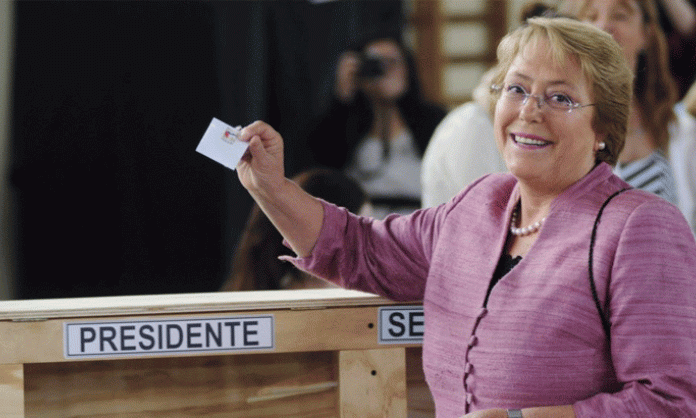We arrived in Santiago just a few days before the Sunday, 17 November, presidential election. On election day, my nine-year-old son Inti and I spent half an hour getting to the voting booth – enough time to explain to him the emotion I felt casting my first ever vote in Chile, 40 years after the military coup.
A few days earlier, we had participated in the closing rally for Marcel Claude, the Humanist Party candidate heading the Todos a la Moneda (everyone to parliament house) campaign, which had rallied some of the left around a platform of radical anti-neoliberal reform. Several tens of thousands attended the rally, but the campaign managed only 3 percent of the vote.
What felt to me a unique moment was anything but that for most Chileans. The majority of eligible voters abstained. In working class areas like La Pintana, more than 60 percent did not vote. Chile now has the lowest electoral participation in Latin America.
Michelle Bachelet, president from 2006 to 2010 and running for a second term in 2013, won this first round of voting with 47 percent of the ballots – the lowest ever vote for the Concertacion (a coalition of parties, rebranded and reconfigured as New Majority in 2013). Just 22 percent of potential voters cast their vote for New Majority’s presidential candidate.
This was despite new and mostly uncritical support of important sections of the left, especially the Chilean Communist Party. Additionally, more than 28 percent of votes were cast for candidates other than Bachelet and her main rival, the hard right’s Evelyn Matthei.
The abstentionism reflects working class cynicism as well as increasing disquiet in the middle classes. The main beneficiary of the latter was the maverick right wing candidate Franco Parisi, who got 10 percent of the presidential vote.
Chile’s neoliberal economic model – based on mining-led economic growth, restricted wage growth and rapidly growing household debt – has proved relatively stable to date.
Preserving this stability has been the priority for the entire political establishment. In her first term, Bachelet continued the neoliberal model, which the hard right Miguel Sebastián Piñera, Chile’s first billionaire president, has since sought to extend. This political consensus has kept the lid on working class struggle but has failed to quell a rising student movement, which under both Bachelet and Piñera waged massive struggles.
But the precariousness and unpopularity of the current economic model are concerns for the Chilean ruling class. These elections have done nothing to alleviate their concerns. The right wing UDI party, whose presidential candidate was the main challenger to Bachelet, lost 10 parliamentary deputies.
The Christian Democrats, which have provided the right wing core of the Concertacion coalition, also suffered significant defeats. So too did some of the more right wing Socialist Party candidates of the Concertacion/New Majority.
Additionally, important figures from recent struggles – especially from the student movement – were elected.
Bachelet will almost certainly win the second round run-off against Matthei on 15 December and, with the independent leftists elected in the lower and upper houses, will have the majority needed to pass the education and tax reform laws her campaign promised.
For the Communist Party, this signals a “great step towards a new Chile”. In reality, it signals a new phase of struggle. The first challenge will be for the student movement to continue to mobilise and not accept Bachelet’s continued subsidies for private education.
The victory of the radical left over the Communist Party in the recent University of Chile Student Federation elections is an indication of the continuing combativity of students.
Bachelet will also have to try to appease supporters of a new constitution. More than 8 percent of voters marked their ballot with the letters AC – for Constituent Assembly. The left of centre presidential candidate Marco Ominami – who ran third with 11 percent – has declared that his candidate for the run-off is “AC”.
The Bachelet government will frame its support for constitutional change in terms of negotiating with the hard right. It aims to channel the sentiment for radical change into further liberal reform of the 1980 “Pinochet” constitution.
Victories for the left will depend on the student movement being able to extend its influence and precipitate a much deeper reorganisation of the radical and revolutionary groups. New alliances will need to be developed – such as June’s joint strike of students, copper miners and maritime workers.
This will not be easy while the CP continues to dominate the left of the Chilean trade union federation.










